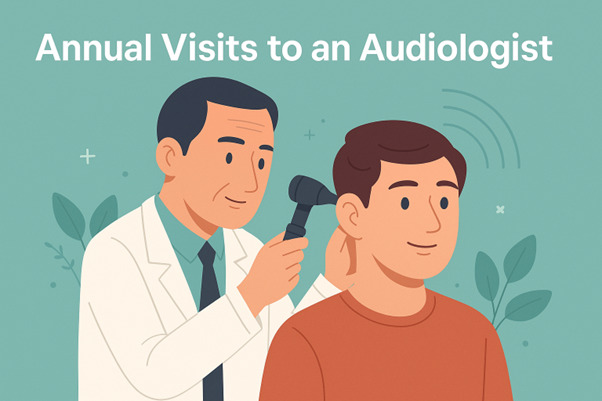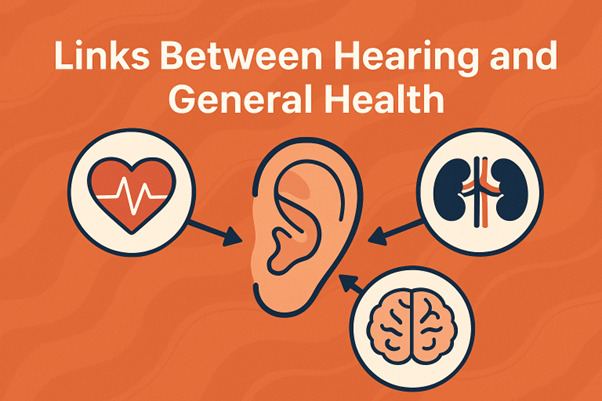
Why Annual Visits to an Audiologist Are Essential for Healthy Hearing and Long-Term Ear Care
Hearing is one of our most valuable senses, yet it is often taken for granted. Unlike changes in eyesight or dental health, hearing loss tends to creep up quietly over time. Many people delay seeking help until communication becomes noticeably difficult or frustration starts to affect their relationships. By then, valuable opportunities for early intervention may already have been missed.
An annual visit to a qualified hearing specialist is more than just a routine check-up. It is a way of safeguarding long-term ear health, protecting balance, and even monitoring wider aspects of wellbeing. Just as you would book yearly dental or eye examinations, hearing deserves the same level of priority.
This article explains why annual visits matter, what they involve, and how they contribute to both ear and overall health.
Why Annual Audiology Visits Matter
Hearing changes are often gradual. A person might adjust by turning up the television or asking others to repeat themselves, without realising that their hearing is declining.
Annual checks are vital because they:
- Detect small changes in hearing before they become significant.
- Allow timely treatment to reduce the risk of further deterioration.
- Establish a clear baseline, making it easier to track changes year on year.
By taking this preventative approach, individuals avoid the consequences of untreated hearing loss such as strained conversations, social withdrawal, and loss of confidence.
Links Between Hearing and General Health

Hearing is closely connected to overall health, and issues with the ears may signal wider medical conditions.
For example:
- Diabetes has been shown to double the risk of hearing loss.
- Cardiovascular disease can reduce blood flow to the inner ear, leading to auditory damage.
- High blood pressure and sleep apnoea have both been linked to a higher likelihood of hearing problems.
An audiology assessment may therefore uncover more than changes in hearing. In some cases, it can prompt individuals to seek further medical advice, helping with the early identification of serious conditions.
Supporting Hearing Aid Users
For people who use hearing aids, annual reviews are especially important. Hearing is not static, and a fitting that worked perfectly a year ago may no longer meet current needs.
During follow-up care, devices are fine-tuned to ensure they provide the clearest and most comfortable experience possible. Small adjustments often make a major difference in everyday listening.
Hearing aids are also subject to wear and tear. Exposure to earwax, moisture, and dust can interfere with performance. Regular maintenance at a hearing clinic helps prevent technical issues, extends the lifespan of devices, and ensures users continue to benefit fully from their investment.
Safeguarding Balance and Cognitive Function
The inner ear is responsible for more than hearing. It plays a central role in balance, which is particularly important as people age. Annual visits help identify issues that could increase the risk of dizziness or falls, both of which can have serious consequences for older adults.
There is also growing evidence linking untreated hearing loss with a higher risk of cognitive decline. When the brain works harder to make sense of unclear sounds, it has fewer resources for memory and concentration. Over time, this strain may contribute to faster rates of decline, especially in those already at risk of dementia.
It is important to be clear: not everyone with untreated hearing loss will develop cognitive impairment. However, research consistently shows that hearing loss increases the likelihood of such conditions. Annual visits therefore provide an opportunity to manage hearing early, reducing that risk and supporting long-term brain function.
What to Expect from an Annual Appointment
Many people are unsure of what a hearing test involves, yet the process is straightforward, painless, and highly informative.
A typical appointment may include:
- Medical and lifestyle discussion to understand hearing concerns.
- Visual examination of the ear canal and eardrum to check for wax, infection, or injury.
- Comprehensive hearing test measuring response to different pitches and volumes.
- Clear explanation of results, with tailored advice on treatment, prevention, or monitoring.
For patients with existing hearing aids, the appointment may also include cleaning, performance checks, and reprogramming where necessary.
How Often Should You Book a Hearing Check?
While annual appointments are widely recommended, the frequency can vary depending on age, lifestyle, and risk factors. Adults under 50 with no noticeable hearing problems may be advised to test every two to three years. However, yearly visits are strongly encouraged for older adults, those with existing hearing loss, or individuals with higher health risks such as diabetes or cardiovascular disease.
Framing annual visits as a preventative measure rather than a strict rule allows each person to receive care that is appropriate to their circumstances. The key point is not to wait until hearing problems become obvious before seeking professional advice.
Conclusion
Hearing is essential to communication, safety, and independence, yet it is often overlooked until problems become unavoidable. Making annual audiology visits a regular part of healthcare ensures that hearing changes are detected early, balance is protected, and cognitive health is supported.
Whether visiting a hearing clinic for the first time or attending for an annual review, these appointments provide reassurance, guidance, and practical solutions. They are not just for those with noticeable hearing problems but for anyone who values long-term wellbeing.
For families and individuals alike, prioritising ear health is an investment in quality of life. By consulting a trusted audiologist, people can maintain sharp hearing and prevent future complications. If you are based in Asia, choosing a reliable audiologist in Singapore located or visiting a professional hearing clinic nearby ensures access to the right expertise and care.